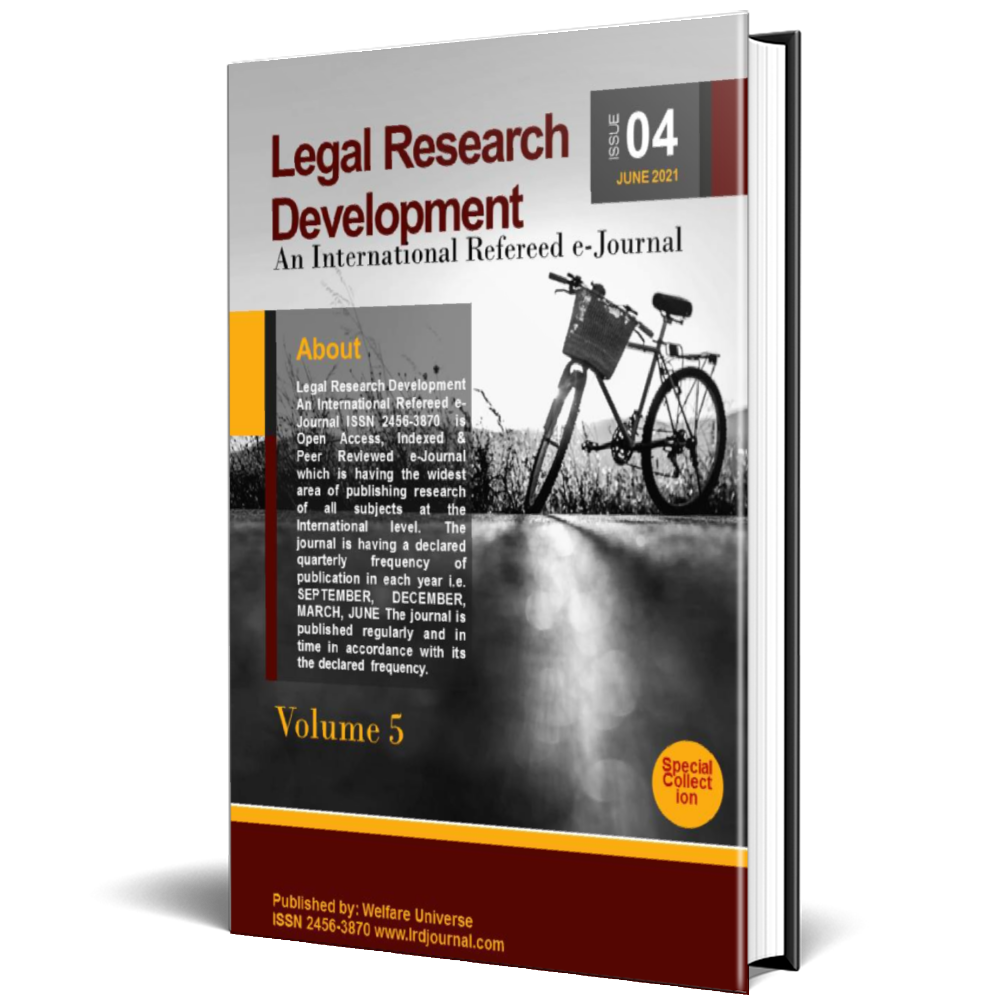National Judicial Commission In India: The New Challenge
DOI:
https://doi.org/10.53724/lrd/v1n1.09Keywords:
NATIONAL JUDICIAL COMMISSION , Art. 50 of our constitution provideAbstract
Art. 50 of our constitution provide - separation of powers and independent judiciary (under directive principles) and Art. 13 of the Indian constitution provide vital power to amend any new statute and empowered to Supreme Court to check the constitutional validity of particular act/statute. For much of its history the Indian judiciary has been regarded as largely fair and incorruptible. No action was taken on the bill but the system of Supreme Court appointments that it envisaged was mandated three years later by the Supreme Court itself. In Supreme Court Advocates-on-Record Association vs. Union of India (1993 (4) SCC. 441) the Court ruled that the Constitution’s provision that the President appoint Supreme Court judges in ‘‘consultation with such Judges of the Supreme Courts...as the President may deem necessary” (Article 124(2)) meant that the advice of the Supreme Court judges was binding upon the President. It also resolved that the judges involved in this ‘consultation’ would be the Chief Justice of India and the two judges next in seniority. This decision was upheld in 1998 in the Third Judges case, only slightly modified to involve the Chief Justice of India and the four judges – rather than two – next in seniority as well as all Supreme Court judges from the candidate’s High Court. The Supreme Court of India and the High Court’s set the standard for judicial conduct and competence in the country. It is vital that we create a National Judicial Commission, combining input from the elected branches of government and the judiciary, to appoint and over see the judges of the Supreme Court and High Court.
References
• M.K. Venu, Author, Editorial Baord, Daily Hindi Nwspaper, Amar Ujala dated 25 Aug. 2014.
• 'A National Judicial Commission - Judicial Appointments and oversight: Vaidya Gullapalli & Jay Prakash Narayan Member/Experts of Lok Satta News Paper - Research Paper.
• A consultation paper on Superior Judiciary, National Commission to review the working of the constitution.
• The Constitution of India, Art. 124 and 217.
Office of the Commissioner for Federal Judicial Affairs: Federal Judicial Appointments Process http://www.fja.gc.ca/jud_app/index_e.html
Ontario Courts: Judicial Appointments Advisory Committee http://www.ontariocourts.on.ca/judicial_appointments/where.htm
Canadian Judicial Council
http://www.cjc-ccm.gc.ca/article.asp?id=2291
Parliament of New South Wales – Research paper on judicial accountability http://www.parliament.nsw.gov.au/prod/parlment/publications.nsf/0/61B8A818DBCD 9DEFCA256ECF000AC6F8
The Process of Appointment of Judges of Some Foreign Countries: Canada, a paper of the Legislative Council Secretariat, Hong Kong
http://www.legco.gov.hk/yr00-01/english/library/0001rp8.pdf.
Appointing Judges: A Judicial Appointments Commission for New Zealand? http://www.justice.govt.nz/pubs/reports/2004/judicialappointment/ appendixtwo.html#northamerica
The Arab Judicial Forum White Papers, Theme 1: Judicial Selection, Ethics and Training http://www.arabjudicialforum.org/ajf_wp_1.html
www.scottish.parliament.uk/business/ research/pdf_res_notes/rn99-49.pdf
Bron McKillop, The Judiciary in France: Reconstructing Lost Independence http://www.jc.nsw.gov.au/fb/fbmckill.htm
Methods of Removing State Judges (American Judicature Website) http://www.ajs.org/ethics/eth_impeachement.asp
Constitutional Reform Act 2005 http://www.hmso.gov.uk/acts/acts2005/20050004.htm
Seventh Annual report of the Ontario Judicial Council http://www.ontariocourts.on.ca/ontario_judicial_council/annualreport/01-02_ENG-AR.pdf
Basic Law for the Federal Republic of Germany
http://www.bundesregierung.de/en/Federal-Government/Function-and-constitutionalba-,10212/IX.-The Judiciary.htm
Dr Kate Malleson, Creating a Judicial Appointments Commission: Which Model Works Best?, Public Law, pp 102-121, 2004
Carmel Rickard, The South African Judicial Service Commission, Centre for Public Law, University of Cambridge, 2003
A Consultation Paper on Superior Judiciary, National Commission to Review the Working of the Constitution.
Downloads
Published
How to Cite
Issue
Section
License

This work is licensed under a Creative Commons Attribution-NonCommercial 4.0 International License.










